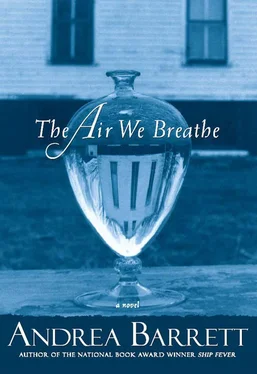“From an apple farm near Ovid,” Ephraim answered. In response to Leo’s puzzled gaze, he added, “One of those little towns in central New York, near the Finger Lakes, named after classical places and writers. Troy, Ithaca, Homer, Virgil…”
“A Jew from Minsk, in the middle of farm country,” Leo said with a smile. “How did that happen?”
Quietly — conversation has always been forbidden during rest hours — the two men leaned toward each other and, breaking the first of many rules, settled in to talk.
IN THE VILLAGE of Tamarack Lake, which is two and a half miles west of us, private cure cottages line the roads fanning up the hills from the water. While Leo settled into his room, Naomi Martin delivered the afternoon trays at the cottage referred to as “Mrs. Martin’s house”—her mother’s house, not hers, eight rooms rented to invalids who needed constant care and feeding. Three times daily she served the boarders in the dining room, in between ferrying treats to the porches where they cured. What had been a weekend chore and a summer job had turned, since her high school graduation in June, into a full-time misery. Day after day, she was trapped in the house that still, after a decade, she refused to think of as home.
Home, as she’d often told her friend Eudora, was the house where she’d been born: yellow-gray stone with two chimneys, a center door with a fanlight, and a front lawn cut in half by a flagstone walk. Tulip trees and holly had dotted the lawn, while peonies and iris thickened each year in the perennial beds. The town of Chester was small and quiet but Philadelphia was close enough for shopping and special trips. Everything ran smoothly; they’d had help. A man — George, she thought his name might have been — took care of the grounds, the carriage, and the horses; also they’d had a maid named Katie, and a cook. After the accident, when the help left, her mother took over the kitchen herself and learned to make meals from a book.
What Naomi remembered of the accident was this: a spring day in 1903, when she was five and her brother Thomas was almost four months old. In the big tub, at the end of the day, in water that Katie had boiled in kettles on the stove, she’d been splashing happily. Outside, her mother was still dividing the irises. Inside, she made a mess and Katie dried her roughly and scolded her, then left to boil more water for Thomas’s bath. She went to her room and brushed her hair. Her mother came in — she called her “Mama” then — and took off her gardening gloves and came upstairs to bathe Thomas, which she liked to do herself, in his special china basin. Katie poured water into the basin and turned away to get more towels. And her mother, talking to Katie about the garden and thinking, perhaps, about her plants, dunked Thomas into the basin without checking the temperature first.
Blue eyes, or brown? Brown hair, or black? After a while, she couldn’t remember. She remembered Thomas’s cries, and her mother’s screams, and Katie sobbing. Her father’s feet pounding up the stairs and the things he said to Katie and her mother. Katie, the next day, slamming out of the house after Naomi’s father dismissed her. She had an uncle who was a doctor and another who was a pharmacist and neither of them could do anything; she remembered their faces. Not the funeral, though, which she wasn’t allowed to attend. And not her father, after a while: or not the way he was before the accident. When she thought of him she saw him after, that year when he stopped going to the law office, started drinking all day, stopped telling her stories or talking to anyone else.
The house began to fall apart, the lawn turned into a meadow, fruit rotted on the ground and weeds sprouted everywhere. One day her father ran away, and later, when someone found him in Texas, her mother divorced him. His brothers, Naomi’s uncles, took the house. Lawyers and bankers came and went, also the women who’d been her mother’s friends. Her mother went to Philadelphia again and again until the night she came home with her face set and made Naomi start packing. Later there was the train heading north and the gray-haired woman who met them at the station: Elizabeth Vigne, Eudora’s aunt. The cure cottage, a big wooden pile made of rooms added to other rooms, porches stacked on other porches, was theirs if they wanted it; Naomi’s mother accepted the job and they went to work.
She’d been eight when they reached Tamarack Lake, with nothing but some clothes and the recipe book that would make her mother’s table famous. By now, prospective boarders in places as distant as Atlanta knew about “Mrs. Martin’s house,” and that had been, her mother said, their salvation. Naomi thought that almost anything would have been better. Live in the woods, live by the ocean, live in another country or on a boat: anywhere but this diseased place. Up and down the hills ran the cottages, lumpy with porches, packed with the sick. Some catered to Cubans, some to vaudeville players, some to insurance workers. Their house catered to the rich.
This afternoon, she was hoping to pry a favor from Miles Fairchild, the wealthiest of her mother’s boarders. Early in his stay he’d taken over their largest room, gaining with it a red armchair, a walnut bed, and paneled bookshelves near the fireplace. His radiators always worked, while his cure chair, as she was reminded when she stepped onto his porch, offered an excellent view. The lake shining at the foot of the hill was green and calm and shaped like a mitten, sprinkled here and there with boats. Nested in soft kapok cushions, Miles might have enjoyed the couples courting in sailboats, children dangling handlines from rowboats, a great blue heron rising from the reeds and flapping slowly, just above the water, to the park at the distant end — but instead, he was reading. The umbrella fixed to the back of his chair he’d angled to shade his pages, shielding his eyes from any brightness.
She straightened her shoulders and moved toward him with her tray. A red ribbon held her hair in a way she knew made her look her best. Her sleeves were turned back to expose her wrists, her apron was fresh and neatly ironed, and as she set his rice pudding down, she willed him to look at her. He was thirty-seven, nearly twenty years her senior, but not yet dead; during the last month he’d gained weight and grown restless in a way she thought she might turn to her advantage.
“Lovely,” he said, glancing first at the dish but then at her, shifting his legs and closing his book as he did. “Thank you.”
“Extra whipped cream,” she announced, stepping back and framing herself against the view. When his eyes followed her figure, she added, “What you said last night…”
At dinner, as she handed around the roast chicken and parsnips, he’d asked if anyone knew where he might hire a car and driver. He was starting a new project, he’d said, obviously pleased with himself. Something involving the inmates at Tamarack State, where he planned to visit one afternoon each week; he needed a chauffeur. She’d continued walking around the long white table, poking the platter between dark shoulders while her mother managed the gravy boat, nodding silently when a boarder thanked her, still saying nothing as she set the platter down on the sideboard and straightened the vases. Even before she pushed through the swinging door to the kitchen, though, she’d started scheming.
“Yes?” Miles said now, his spoon poised over the dish.
“I thought I might drive you to Tamarack State,” she said. “I’m an excellent driver; I already run most of the household errands but I’d like a chance to work on my own. To earn some money.”
Читать дальше












